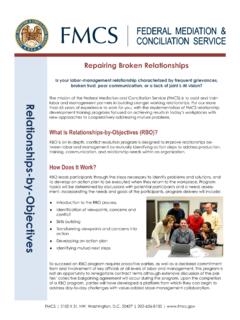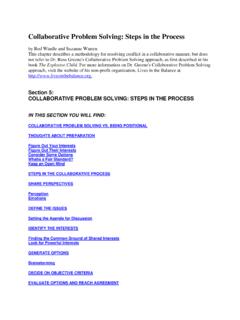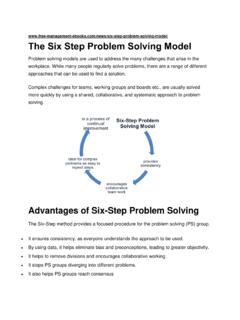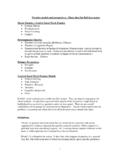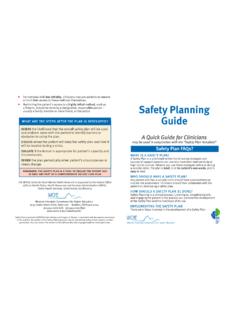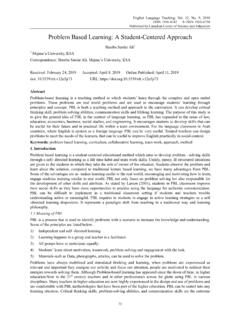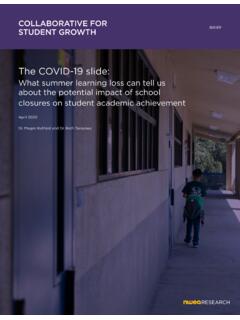Transcription of Joint Problem-Solving for Mutual Gain
1 Joint Problem-Solving for Mutual Gain Interest-Based Bargaining FMCS | 2100 K St. NW, Washington, 20427 | 202-606-8100 | Is your labor-management relationship characterized by frequent grievances, broken trust, poor communication, or a lack of Joint L-M vision? The mission of the Federal Mediation and Conciliation Service (FMCS) is to assist and train labor and management partners in building stronger working relationships. Put our more than 65 years of experience to work for you, with the implementation of FMCS relationship development training programs focused on achieving results in today s workplaces with new approaches to cooperatively addressing Mutual problems. What Is Interest-Based Bargaining (IBB)? IBB is a collaborative approach to resolving labor and management disputes.
2 Through the process, parties proactively identify durable solutions to outcomes at the bargaining table. Agreements are based on Mutual and individual interests rather than positions. This ap-proach emphasizes problem solving and enables Mutual gain outcomes. The Federal Mediation IBB Program Has Four Stages: 1. Orientation to IBB 2. Training in IBB Principles and Techniques 3. Bargaining Preparation 4. Bargaining During the Orientation Session, parties re-ceive an overview of the process and use that information to decide whether to partic-ipate in training. At the training session, par-ticipants learn about the principles, beliefs, steps and techniques of IBB. Following the training program, the participants make a decision about using the IBB process during the next contract negotiation. If the decision is made to use the process, the parties enter the preparation phase and then begin the bargaining process.
3 How Does It Work? (cont.) The Interest-Based process includes the following steps in a Joint Problem-Solving process: 1. Identifying the Issue What is the problem ? What has been occurring? Why is it a problem ? 2. Identifying Individual and Mutual Interests Why do you want to resolve the problem ? What do the parties care about? What concerns them? What is at the heart of the matter? Why do they believe a change or contract provision is needed? 3. Brainstorming Options The parties identify all possible solutions to the issue. 4. Developing Standards for Selecting the Solution(s) instead of using adversarial, power-based meth-ods for arriving at a solution, the parties develop objective criteria to judge the options. 5. Selection of the Solution from those options that meet the criteria.
4 What Are Interests? Interests are the underlying reasons, concerns, needs, and basis for seeking resolution of a problem . The traditional approach is to determine a solution unilaterally, based on our own information and interests, and then attempting to persuade others to accept our solution. This often results in conflict when the of-fered solution has the potential to harm the interests of the other party. How Does IBB Differ from Traditional Bargaining? One of the major differences between traditional Problem-Solving approaches and interest-based ap-proach includes an increased dialogue which promotes a better understanding of the issues being dis-cussed. From this, the group can engage in a meaningful discussion about which solution will best meet, and not harm, the interests of both parties.
5 Therefore, strong communication and active-listening skills are essential for ensuring that everyone s interests are expressed, heard, and understood. Also in this process, it is critical to explore a broad array of possible solutions so that the best solution, addressing the most interests, is achieved. This is done by using brainstorming, a method of idea genera-tion that encourages quantity and discourages evaluation. Because brainstorming does not involve the evaluation of options, the method for identifying the options which can be further considered is by use of jointly developed and objective criteria. Criteria that focuses on feasibility, relation to the interests of the parties, and acceptability, reduces the list down to those ideas which will provide the greatest Mutual benefit.
6 Another difference is that decisions made by consensus rather than power. In the traditional labor-management arrangement, the parties use power-based methods to force a resolution acceptable to them. Consensus decision-making requires that the solution be supported by all group members, not just a majority. Full and open dialogue, incorporating the input of all participants and stakeholders, and a willingness to be open to the ideas of others, are important components of this process. For More Information For more information about FMCS and its programs, please contact the National Office or visit our website at FMCS | 2100 K St. NW, Washington, 20427 | 202-606-8100 |
